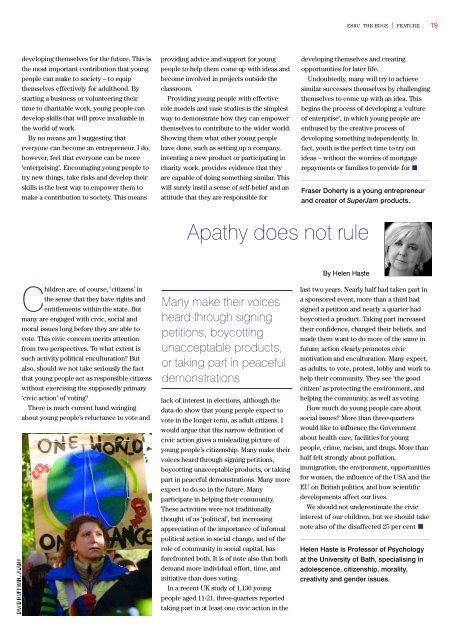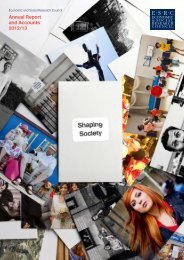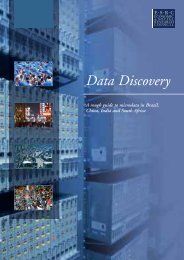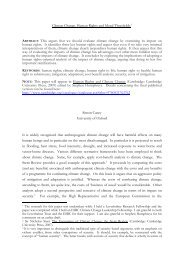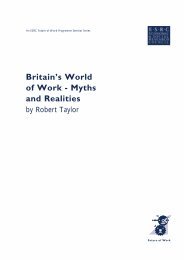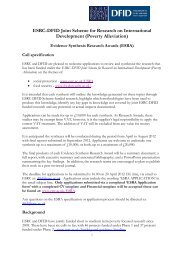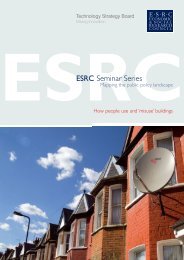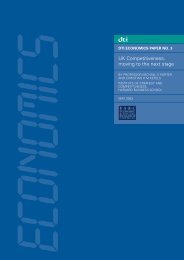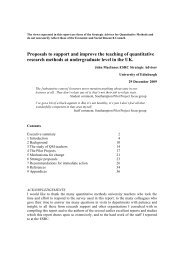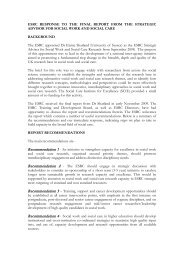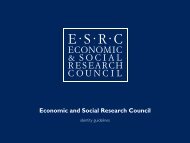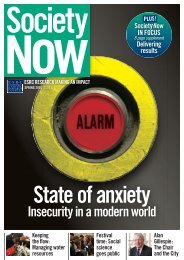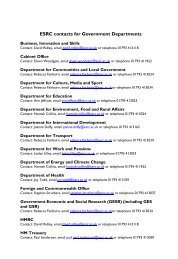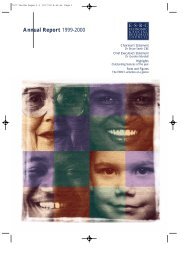Issue 26 - November 2007 (PDF, 1.69Mb) - ESRC
Issue 26 - November 2007 (PDF, 1.69Mb) - ESRC
Issue 26 - November 2007 (PDF, 1.69Mb) - ESRC
You also want an ePaper? Increase the reach of your titles
YUMPU automatically turns print PDFs into web optimized ePapers that Google loves.
developing themselves for the future. This is<br />
the most important contribution that young<br />
people can make to society – to equip<br />
themselves effectively for adulthood. By<br />
starting a business or volunteering their<br />
time to charitable work, young people can<br />
develop skills that will prove invaluable in<br />
the world of work.<br />
By no means am I suggesting that<br />
everyone can become an entrepreneur. I do,<br />
h o w e v e r, feel that everyone can be more<br />
‘enterprising’. Encouraging young people to<br />
try new things, take risks and develop their<br />
skills is the best way to empower them to<br />
make a contribution to society. This means<br />
Children are, of course, ‘citizens’ in<br />
the sense that they have rights and<br />
entitlements within the state. But<br />
many are engaged with civic, social and<br />
moral issues long before they are able to<br />
vote. This civic concern merits attention<br />
from two perspectives. To what extent is<br />
such activity political enculturation? But<br />
also, should we not take seriously the fact<br />
that young people act as responsible citizens<br />
without exercising the supposedly primary<br />
‘civic action’ of voting?<br />
There is much current hand wringing<br />
about young people’s reluctance to vote and<br />
providing advice and support for young<br />
people to help them come up with ideas and<br />
become involved in projects outside the<br />
c l a s s r o o m .<br />
Providing young people with effective<br />
role models and case studies is the simplest<br />
way to demonstrate how they can empower<br />
themselves to contribute to the wider world.<br />
Showing them what other young people<br />
have done, such as setting up a company,<br />
inventing a new product or participating in<br />
charity work, provides evidence that they<br />
are capable of doing something similar. This<br />
will surely instil a sense of self-belief and an<br />
attitude that they are responsible for<br />
Apathy does not rule<br />
Many make their voices<br />
heard through signing<br />
petitions, boycotting<br />
unacceptable products,<br />
or taking part in peaceful<br />
demonstrations<br />
lack of interest in elections, although the<br />
data do show that young people expect to<br />
vote in the longer term, as adult citizens. I<br />
would argue that this narrow definition of<br />
civic action gives a misleading picture of<br />
young people’s citizenship. Many make their<br />
voices heard through signing petitions,<br />
boycotting unacceptable products, or taking<br />
part in peaceful demonstrations. Many more<br />
expect to do so in the future. Many<br />
participate in helping their community.<br />
These activities were not traditionally<br />
thought of as ‘political’, but increasing<br />
appreciation of the importance of informal<br />
political action in social change, and of the<br />
role of community in social capital, has<br />
forefronted both. It is of note also that both<br />
demand more individual effort, time, and<br />
initiative than does voting.<br />
In a recent UK study of 1,136 young<br />
people aged 11-21, three-quarters reported<br />
taking part in at least one civic action in the<br />
<strong>ESRC</strong> THE EDGE | F E AT U R E 19<br />
developing themselves and creating<br />
opportunities for later life.<br />
U n d o u b t e d l y, many will try to achieve<br />
similar successes themselves by challenging<br />
themselves to come up with an idea. This<br />
begins the process of developing a ‘culture<br />
of enterprise’, in which young people are<br />
enthused by the creative process of<br />
developing something independently. In<br />
fact, youth is the perfect time to try out<br />
ideas – without the worries of mortgage<br />
repayments or families to provide for<br />
Fraser Doherty is a young entrepreneur<br />
and creator of SuperJam products.<br />
By Helen Haste<br />
last two years. Nearly half had taken part in<br />
a sponsored event, more than a third had<br />
signed a petition and nearly a quarter had<br />
boycotted a product. Taking part increased<br />
their confidence, changed their beliefs, and<br />
made them want to do more of the same in<br />
future; action clearly promotes civic<br />
motivation and enculturation. Many expect,<br />
as adults, to vote, protest, lobby and work to<br />
help their community. They see ‘the good<br />
citizen’ as protecting the environment, and<br />
helping the community, as well as voting.<br />
How much do young people care about<br />
social issues? More than three-quarters<br />
would like to influence the Government<br />
about health care, facilities for young<br />
people, crime, racism, and drugs. More than<br />
half felt strongly about pollution,<br />
immigration, the environment, opportunities<br />
for women, the influence of the USA and the<br />
EU on British politics, and how scientific<br />
developments affect our lives.<br />
We should not underestimate the civic<br />
interest of our children, but we should take<br />
note also of the disaffected 25 per cent<br />
Helen Haste is Professor of Psychology<br />
at the University of Bath, specialising in<br />
adolescence, citizenship, morality,<br />
creativity and gender issues.


